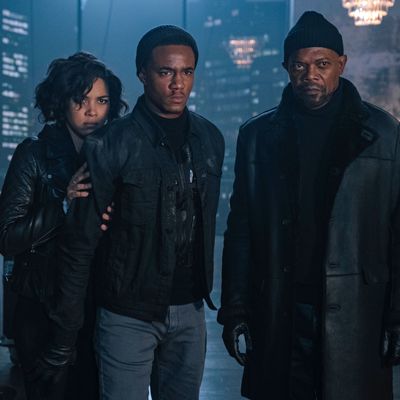
If the new Shaft were a person, it would be a flasher cackling at your discomfort and saying, “Don’t be such a pussy.” It’s so aggressively puerile and phallocentric (big swinging dicks, big guns) it could be taken as a parody of a puerile, phallocentric action comedy — a hotfoot to feminists and girly-men. That’s a distinction without a difference, though, since either way it stinks to heaven.
The original, 1971 Shaft, Richard Roundtree, was — per Isaac Hayes — a “black private dick that’s a sex machine to all the chicks,” whereas Samuel L. Jackson as John Shaft’s son in the 2000 sequel/remake — a sad comedown for the late John Singleton — didn’t have that oversexed vibe. He was angry, bug-eyed, serious. He was Samuel L. Jackson. That Shaft wasn’t focused on sex anyway — it was another forgettable vigilante picture. Jackson could have had any other name, but the studio had the brand and the theme song for this one.
In contrast, the 2019 Shaft is a lame mismatched buddy action comedy, of the sort that thrived in the ’80s and nowadays makes late-night cable that much more depressing. Jackson — looking every one of his 70 years — is now presented as catnip to the ladies and has been paired with Jessie T. Usher as the prim, anti-macho, MIT-graduate son he hasn’t seen in decades. Usher is a Will Smith type — he was cast as Smith’s pilot’s son in the catastrophic Independence Day sequel after Smith declined to re-up — and has to endure lines from Jackson like, “Your mom did one hell of a job turning you into a certified white boy.” Usher has to sputter in self-defense (in falsetto) that he does, too, “like pussy.” He has to say to Jackson, “Please don’t use the N-word.” He has to priss, “I’m anti-gun.” Most degrading of all, Jackson calls him Don Lemon.
Actually, it would be cool if the filmmakers gave Shaft a gay son or a son that thinks guns are tearing up the fabric of his community, but Shaft III is only a closet pussy. It turns out that he can fight, and he blows away a horde of scummy thugs as easily as his dad. The movie makes him best friends with a liberal, feminist doctor named Sasha (Alexandra Shipp) who doesn’t really see him as a man man — that is, until he starts picking off bad guys in slow motion, after which there’s a close up of Sasha biting her lower lip and her eyes widening as “Be my — be my little baby — be my baby miiiine …” floods the soundtrack.
That does sound like a parody of a right-wing Neanderthal movie — except the same motifs are hit again and again in less ironic contexts. Shaft is always cracking jokes about “bi-curious” or “cisgender” people, and even Shaft III’s surly FBI boss (Titus Welliver, getting a paycheck wherever he can) complains about “my 7-year-old daughter who wants me to call her Frank.” Shaft finds a PTSD support group for soldiers immediately suspect because the name — Brothers Watching Brothers — sounds “homo” to him, and also because (this is suggested by Jackson’s Eastwood-like look of distaste) real men don’t get PTSD. It’s okay, though, because Shaft proves you can wear clothes from the Gap and not use the N-word and drink coconut water and be a real man as long as you can pull that trigger. And Shaft, who says, “Real men don’t apologize,” finally does say he’s sorry to his ex-wife (Regina Hall) for leaving her those many years ago and not being there for their son (because his father — Roundtree — wasn’t there for him, you see), and everyone smiles when Shaft III finally asks Sasha for a date.
Roundtree shows up as Gramps, who has what might be the biggest collection of automatic and semi-automatic pistols in Harlem, whereupon all three generations go off to rescue the feminist doctor taken prisoner by the heroin kingpin. I go to a lot of action movies, so I’d be a hypocrite if I held forth here on the evils of using gun violence for kicks. Gun violence is part of the vocabulary of cinema, for better and worse. But the director, Tim Story, doesn’t stage the shoot-outs for suspense. He stages them for campy laughs, the kind where two heroes shoot someone five times and then give each other a high five. The staging isn’t inventive — the only time I laughed was when Usher’s Shaft III tried to swing through a window like Roundtree in the original and bounced off it, pitifully.
The only reason I stayed in my seat was Regina Hall. Shaft opens with a flashback to 1989 when she’s railing at Jackson in a car, and the scene would be a misogynist cliché except that Hall’s timing is such a thing of beauty that even Jackson seems impressed. Later, Story gives her a nice Travis Bickle bit in which she tries to talk herself down in a restaurant bathroom mirror. (The only way I’d ever pick up a Blu-ray of this movie is if there were half an hour of Hall in that mirror.) I have to give the 2019 Shaft this: The 1971 original wouldn’t have let one of Shaft’s women run away with the picture.


